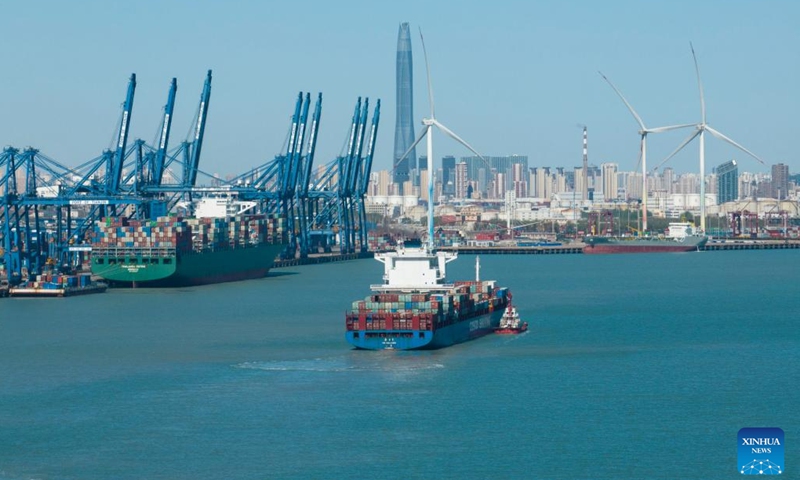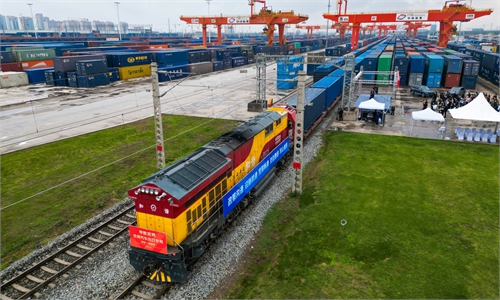
This aerial photo taken on April 7, 2023 shows a container ship sailing at Tianjin Port in north China's Tianjin. North China's Tianjin Port handled approximately 5.047 million twenty-foot equivalent units (TEUs) of containers in the first three months of 2023, up 9.09 percent year on year.(Photo: Xinhua)
While China recorded a 5.8-percent growth in foreign trade over the first four months this year, its trade with the US dropped 4.2 percent year-on-year amid Washington's continued "decoupling push", which started to hit bilateral commerce.China's exports and imports with the US stood at 1.5 trillion yuan ($216.65 billion) from January to April, down 4.2 percent from the same period last year. The share of the bilateral trade dropped to 11.2 percent of China's total foreign trade volume from the 12 percent seen in 2022, data released by China's General Administration of Customs (GAC) showed on Tuesday.
The US remained China's third largest trading partner, behind ASEAN and EU. In breakdown, China's exports to the US totaled 1.09 trillion yuan, down 7.5 percent year-on-year; while its imports from the US totaled 410 billion yuan, up 5.8 percent.
China has embraced diversified foreign trade markets around the world, with growing trade momentum with ASEAN, countries and regions joining the Belt and Road Initiative (BRI), experts said.
According to GAC data, China-ASEAN trade surged by 13.9 percent to reach 2.09 trillion yuan, while China's trade with countries participating in BRI rose 16 percent to reach 4.61 trillion yuan during the first four months. Under the BRI framework, China's trade with five Central Asian countries increased by 37.4 percent.
It draws a stark contrast to the drop of the bilateral trade between the world's two largest economies. Not only has the Biden administration been unwilling to remove added tariffs on Chinese products, it has continuously maneuvered to "decouple" from China, experts noted.
There are multiple reasons for falling exports to the US, including the impact of the extra tariffs, the higher base last year, and others, Gao Lingyun, an expert at the Chinese Academy of Social Sciences in Beijing, told the Global Times on Tuesday.
There are some positive factors that deserve attention, including growing imports from the US which reflected the rapidly recovering Chinese economy, and the country's colossal consumer market opened wider to the world, Gao noted.
In fact, many US businesses acknowledge that the Chinese market is indispensable, especially for advanced technologies. In a recent interview with Bloomberg, John Neuffer, President and CEO of the US Semiconductor Industry Association, said that China is still "our biggest market" and "we need to play in that market."
China is the biggest semiconductor market in the world. It is in no party's interest to push for "decoupling" from China, sever supply chains and disrupt the market, Mao Ning, a Foreign Ministry spokesperson said on Thursday.
The US' decoupling push "will destabilize the global industrial and supply chains, hamper global economic development and ultimately backfire on the US itself," Mao said.
China remains committed to high-level opening up and stands ready to share its development opportunities with global markets. Since China adjusted its COVID-19 response, many foreign business executives have paid visits to the country, including CEOs of some US tech giants.
Despite a falling China-US trade in the first four months, Gao expressed cautious optimism over long-term prospects as closer trading ties are in line with both sides' interests. Both uncertainties remain.
In a meeting with US Ambassador to China Nicholas Burns in Beijing on Monday, China's State Councilor and Foreign Minister Qin Gang said that the pressing task is to stabilize China-US relationship, avoid a spiral decline, and prevent any unexpected incidents between the two countries. "The US must respect China's bottom lines and red lines, and stop harming China's sovereignty, security, and development interests," he noted.


